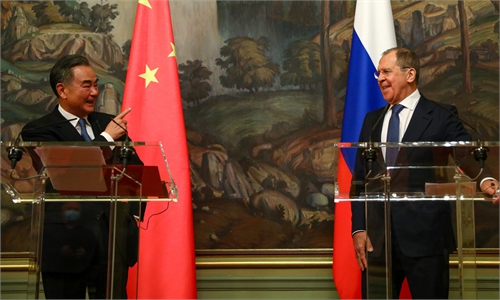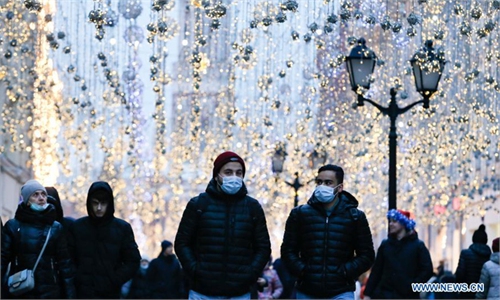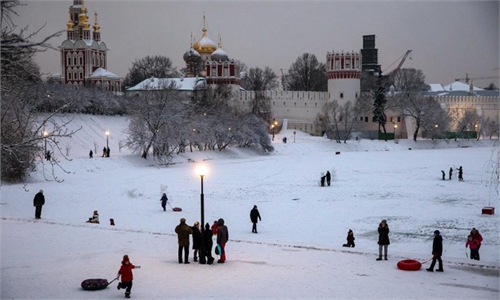China, Russia continue to cooperate on fighting color revolutions, safeguarding political security: Wang Yi
Beijing, Moscow may ‘enhance intel sharing’ to fight ‘color revolutions’
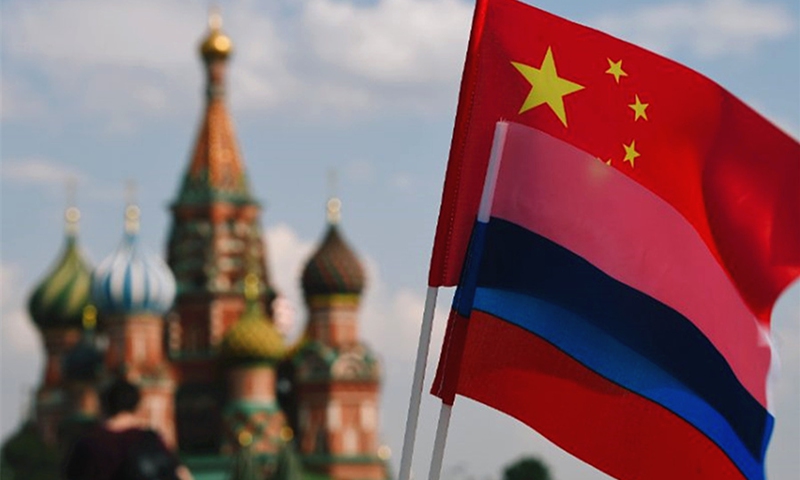
The national flags of China and Russia are seen on Red Square, Moscow.(Photo: Xinhua)
Chinese State Councilor and Foreign Minister Wang Yi said on Sunday China and Russia will continue to cooperate in fighting the color revolutions and disinformation, and safeguarding political security together in 2021, which marks the 20th anniversary of the China-Russia Treaty of Good-Neighborliness and Friendly Cooperation.
Chinese analysts said that to fight the color revolutions and disinformation, China and Russia can further promote cooperation on intelligence sharing, cybersecurity management and information exchanges over military affairs and transnational crime.
According to Wang, the two countries have agreed to renew the Treaty of Good Neighborliness and Friendly Cooperation and inject new meaning into it in the new era.
"This is a milestone in China-Russia relations and, more importantly, a new starting point," Wang said.
In the face of the once-in-a-century COVID-19 pandemic, China and Russia have stood shoulder to shoulder and worked closely to combat both the coronavirus and the "political virus, Wang said, noting that China and Russia standing together will remain a pillar of world peace and stability.
Wang made the remarks in response to a Russian reporter from TASS who asked the first question among foreign correspondents, at a press conference on the sidelines of the fourth session of the 13th National People's Congress.
"The more unstable the world is, the greater the need for carrying forward China-Russia cooperation," Wang said. He said that China and Russia should be each other's strategic supporter, development opportunity and global partner, as this is both experience gained from history and an imperative under the current circumstances.
Yang Jin, an associate research fellow at the Institute of Russian, Eastern European and Central Asian Studies of the Chinese Academy of Social Sciences (CASS), told the Global Times on Sunday that bilateral cooperation in response to a possible "color revolution" is urgent as both China and Russia have been challenged by foreign interventionists.
Anti-government protests took place in cities across Russia including Moscow in January, in support of opposition leader Alexei Navalny. Western media outlets said more than 3,000 protesters were arrested.
The US has played a role in hyping the protests. However, analysts said the superiority of the US model has been crushed by the pandemic and now Washington is not capable of launching another round of the Color Revolution.
Also, Yang said that the nature of the crisis gripping China's Hong Kong since the anti-extradition bill protests in 2019 was essentially an attempted Color Revolution backed by the US and the West.
Yang said the two countries shared common interests in opposition to potential "color revolutions." The US and its allies have tried to contain the development of China and Russia by encouraging and even seeking to overthrow the governments by supporting and encouraging protests using the excuses of so-called democracy and human rights issues.
The two countries could improve their intelligence sharing in the fields of cybersecurity and military, and enhance joint efforts in cracking down on transnational crimes and cyber management, Yang predicted.
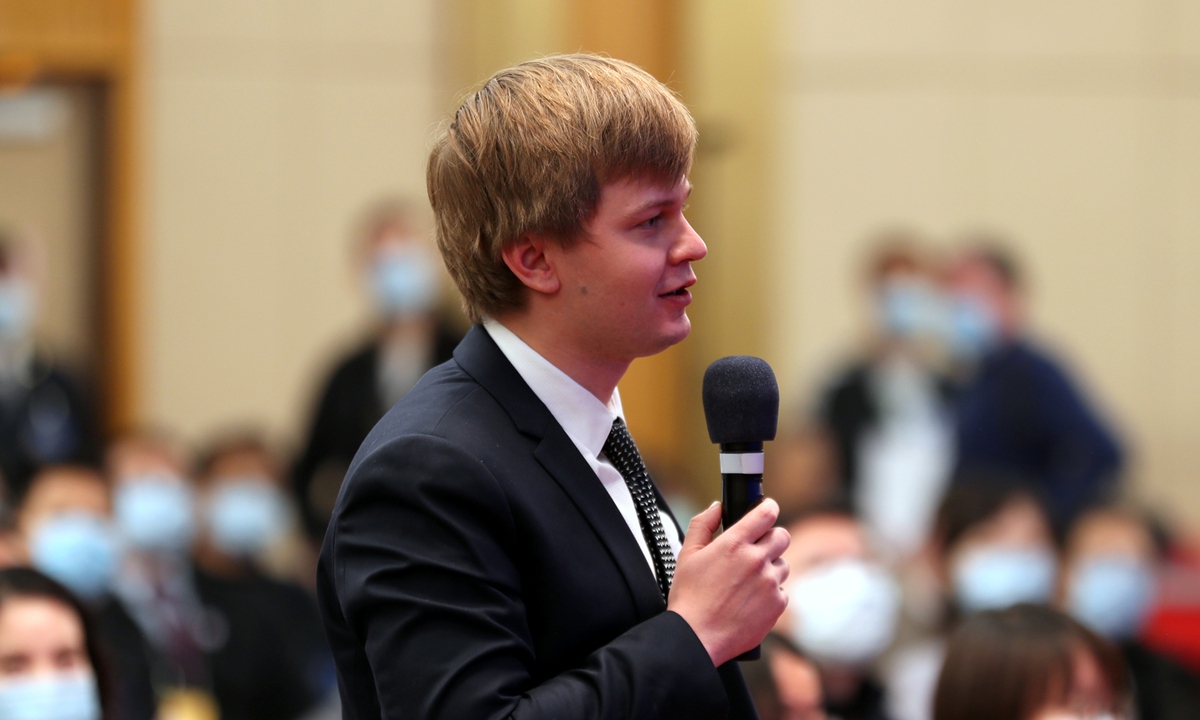
A reporter with Russia's TASS news agency asks a question at a virtual press conference held by Chinese State Councilor and Foreign Minister Wang Yi on Sunday on the sidelines of the ongoing fourth session of the 13th National People's Congress in Beijing. Wang, during the event, took questions from reporters on China's foreign policy and relations. Photo: cnsphoto
Apart from high-level exchanges, China and Russia can promote youth communications and media publicity in sharing healthy stories over mutual cooperation, which can set the stage to effectively defend against value infiltration by Western countries and avoid the potential Color Revolutions, Yang said.
Wu Hongwei, a research fellow of the Institute of Russian, Eastern European and Central Asian Studies, CASS, told the Global Times on Sunday that Wang's remarks again showed the extraordinarily important and high-level relationship between the two countries.
In the new era, the two countries will solidify and deepen cooperation and closely collaborate in the areas of politics, economy, national security and military, Wu predicted. Such strategic coordination has no upper limits.
The two sides will carry forward the spirit of friendship and win-win cooperation embodied by the treaty, keep up the momentum, generate new dynamism, and further expand, broaden and deepen the China-Russia comprehensive strategic partnership of coordination, Wang noted.
Wang said that China and Russia will set an example of strategic mutual trust, mutually beneficial cooperation, people-to-people connectivity and equity and justice.
"We will deepen the synergy on the Belt and Road Initiative and the Eurasian Economic Union, upgrade economic, trade and investment cooperation, and expand cooperation in emerging areas such as scientific and technological innovation and the digital economy," the foreign minister said.
The two countries will jointly uphold multilateralism, the authority of the UN, international law and basic norms governing international relations, and global strategic stability.
A series of interactions and cooperation between China and Russia has raised concerns in the West, as some observers speculated that the China-Russia partnership will be transformed into a military alliance and bring a new Cold War to the world.
A military alliance is not an option for both sides at the moment, Yang said. The military alliance is not flexible and will bring new problems, and the current strategic partnership is enough for the two sides to handle common challenges and remain flexible to serve their own interests, he noted.

